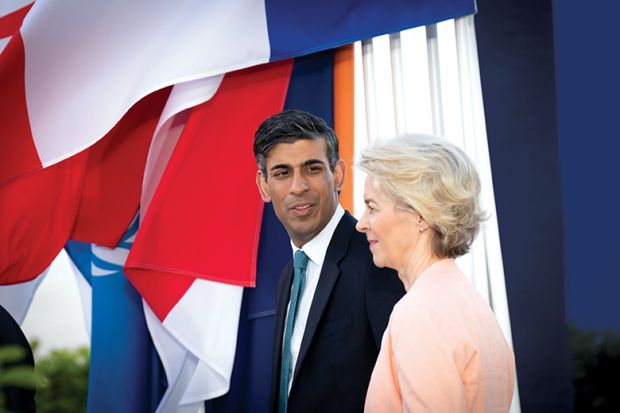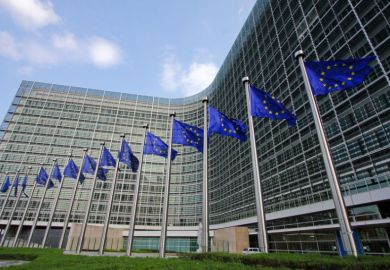When Rishi Sunak and Ursula von der Leyen met earlier this month, hopes were dashed that the UK and the EU would – at last – agree on UK association to Horizon Europe. The case for association has been made consistently by Europe’s scientific community for years, on both sides of the Channel. It is not contested by any serious politician in the UK or the EU. So why is UK association to Horizon Europe still so difficult to realise, even after the Windsor Framework removed disagreement over the Northern Ireland protocol?
The key difficulty is around the financial contributions of the UK agreed in the UK-EU Trade and Cooperation Agreement (TCA). The UK would be expected to contribute a sum calculated according to its GDP, a little under €2 billion (£1.7 billion) a year. If UK researchers get less out of the common pot than the UK puts in, the EU benefits. Only if the imbalance exceeds 12 per cent may the UK ask for measures to be taken for this to be addressed – including, for instance, a “performance review”. If the imbalance exceeds 16 per cent, the UK may even withdraw from the programme.
Conversely, if the UK receives more than it pays in by 8 per cent over two years, then a correction mechanism kicks in (in the EU’s favour), with the UK paying an additional contribution above that figure. In short, a correction mechanism automatically applies in the EU’s favour, but the UK can only ask for measures to be taken (and at a higher threshold of 12 per cent).
The UK could insist that the provisions of the TCA be renegotiated to create equivalence with other associated countries, most of which do have a symmetric automatic correction mechanism (of 8 per cent) applied both ways. However, a plea by the UK to renegotiate the terms of an agreement it made only recently, simply because it changed its mind, would press all the wrong buttons in Brussels.
At the same time, the EU would be wise to consider carefully that the suspension of association since 2021 has created a situation that is very different from what was envisaged when the TCA was signed. Indeed, the worst outcome might be for the UK to join under existing terms, only to find one year later that the contributions imbalance exceeds 16 per cent, giving it reasons to leave Horizon Europe for good.
It is difficult to gauge precisely how disruptive non-association has been. UK engagement in the European Research Council has been remarkably robust, with UK-based researchers being awarded more than 15 per cent of the most recent Advanced Grants and Consolidator Grants (even if the awards were then paid by the UK owing to non-association). But applications to Pillar II, through collaborative proposals, have taken a deep dive, with the overall proportion of Horizon Europe participants accounted for by the UK (and this includes ERC applications) halving to 4.9 per cent (compared with 9.8 per cent in Horizon 2020).
Upon association, how quickly would UK-based researchers reinvigorate their research links through Horizon Europe collaborative grants? The UK and the EU have different answers to this question. But all speculation about how the UK would fare under association is immaterial to a basic political reality. In establishing the principle of a correction mechanism, the EU has in practice accepted that the association of third countries cannot be sustainable if there is a large and ongoing imbalance of payments in either direction.
Indeed, the purpose of Horizon Europe is not for the EU (or any associated country) to make a financial gain. The purpose of Horizon Europe is to maximise scientific benefit through collaboration and excellence. That applies to all associated countries – and that must include the UK. Especially at a time when the G7 has highlighted the need for science collaboration in strategically important areas, the rationale for scientific collaboration must be paramount.
The central objective for the EU and the UK, therefore, must be to find an agreement that ensures both partners are content with their science relations for the long term, for Horizon Europe and beyond. And that is surely possible within what has already been agreed. For instance, the EU could give the UK an additional assurance to firm up an understanding that it would de facto apply a correction mechanism in the interests of a long-term science partnership.
For the EU and for the UK, the time has come to build their relationship on trust. They have to leave behind the suspicions and instabilities of the past five years. They must acknowledge that the UK no longer enjoys the same leverage over the EU that it had as a member. And, acknowledging the UK’s third-country status, they must appreciate the particular opportunity to build strong relations precisely because of a long shared past.
An agreement on the UK’s Horizon Europe association is still tantalisingly close. Not reaching one would constitute a spectacular failure of political will.
Jan Palmowski is secretary general of the Guild of European Research-Intensive Universities.
POSTSCRIPT:
Print headline: Horizon Europe UK bar would be political failure
Register to continue
Why register?
- Registration is free and only takes a moment
- Once registered, you can read 3 articles a month
- Sign up for our newsletter
Subscribe
Or subscribe for unlimited access to:
- Unlimited access to news, views, insights & reviews
- Digital editions
- Digital access to THE’s university and college rankings analysis
Already registered or a current subscriber?







